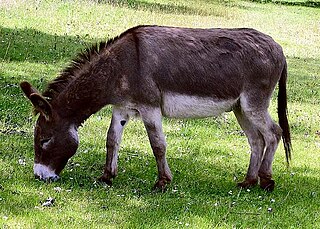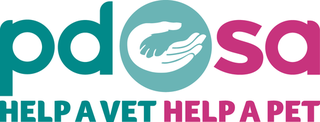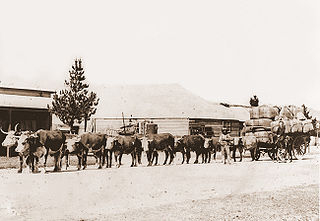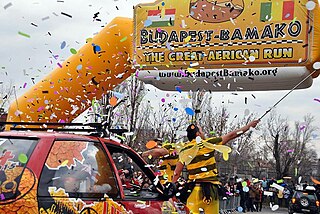
The mule is a domestic equine hybrid between a donkey and a horse. It is the offspring of a male donkey and a female horse. The horse and the donkey are different species, with different numbers of chromosomes; of the two possible first-generation hybrids between them, the mule is easier to obtain and more common than the hinny, which is the offspring of a male horse and a female donkey.

The donkey or ass is a domesticated equine. It derives from the African wild ass, Equus africanus, and may be classified either as a subspecies thereof, Equus africanus asinus, or as a separate species, Equus asinus. It was domesticated in Africa some 5000–7000 years ago, and has been used mainly as a working animal since that time.

The Sahara is a desert spanning across North Africa. With an area of 9,200,000 square kilometres (3,600,000 sq mi), it is the largest hot desert in the world and the third-largest desert overall, smaller only than the deserts of Antarctica and the northern Arctic.

Alexander Martin Clunes is an English actor, director and television presenter. He is best known for portraying Dr Martin Ellingham in the ITV comedy-drama series Doc Martin, Gary Strang in Men Behaving Badly, and William Shawcross in William and Mary. Clunes has narrated a number of documentaries for ITV, the first of which was Islands of Britain in 2009. He has since presented a number of documentaries centred on animals. He has also voiced Kipper the Dog in the animated series Kipper.

The PDSA Dickin Medal was instituted in 1943 in the United Kingdom by Maria Dickin to honour the work of animals in World War II. It is a bronze medallion, bearing the words "For Gallantry" and "We Also Serve" within a laurel wreath, carried on a ribbon of striped green, dark brown, and pale blue. It is awarded to animals that have displayed "conspicuous gallantry or devotion to duty while serving or associated with any branch of the Armed Forces or Civil Defence Units". The award is commonly referred to as "the animals' Victoria Cross".

A pack animal, also known as a sumpter animal or beast of burden, is a working animal used to transport goods or materials by carrying them, usually on its back.

The Mauritania national football team, nicknamed Al-Murabitun in the reference to Almoravid dynasty, represents Mauritania in men's international football. It is controlled by the Féderation de Football de la République Islamique de Mauritanie, and is a member of the Confederation of African Football. They have not qualified for the FIFA World Cup. However, in the Amílcar Cabral Cup, a regional tournament for West Africa, Mauritania came fourth in 1980 on hosting the competition. The national football team of Mauritania later runners-up in 1995, losing on penalties to Sierra Leone after the final finished 0–0.

The People's Dispensary for Sick Animals (PDSA) is the UK's leading veterinary charity carrying out more than one million free veterinary consultations a year. It was founded in 1917 by Maria Dickin to provide care for sick and injured animals of the poor. Until 2009 PDSA was the largest private employer of fully qualified veterinary surgeons and veterinary nurses in the UK. Use of the PDSA's services are restricted to those within their Catchment area

A working animal is an animal, usually domesticated, that is kept by humans and trained to perform tasks instead of being slaughtered to harvest animal products. Some are used for their physical strength or for transportation, while others are service animals trained to execute certain specialized tasks. They may also be used for milking or herding. Some, at the end of their working lives, may also be used for meat or leather.

The Budapest-Bamako or Great African Run is a charity car race in Europe and Africa, and the largest amateur rally in the world. It is a low-budget version of the Dakar Rally, and goes from Budapest, Hungary to Bamako, Mali through the Sahara. It passes through Hungary, Austria or Slovenia, Italy, France, Spain, Morocco, Mauritania and Mali. The Budapest-Bamako was inspired by the Paris-Dakar Rally. There are few entry restrictions: as long as a vehicle is street legal, it can join the event.

World Animal Protection, formerly The World Society for the Protection of Animals (WSPA), is an international non-profit animal welfare organization that has been in operation since 1981. The charity's mission is to create a better world for animals by protecting them.
African horse sickness (AHS) is a highly infectious and often fatal disease caused by African horse sickness virus. It commonly affects horses, mules, and donkeys. It is caused by a virus of the genus Orbivirus belonging to the family Reoviridae. This disease can be caused by any of the nine serotypes of this virus. AHS is not directly contagious, but is known to be spread by insect vectors.
The Horse Trust is an equine charity in the United Kingdom, based at Speen near Princes Risborough in Buckinghamshire. It was founded in 1886 and is the oldest equine charity in the world. It was set up to help the working horses in London. Upon the decline of the working horse in the 1960s it widened its remit to include education and research, becoming the largest provider of equine welfare grants in the United Kingdom.

Greater Mauritania is a term for the Mauritanian irredentist claim that generally includes the Western Sahara and other Sahrawi-populated areas of the western Sahara Desert. The term was initially used by Mauritania's first President, Mokhtar Ould Daddah, as he began claiming the territory then known as Spanish Sahara even before Mauritanian independence in 1960.

Redwings Horse Sanctuary is a registered charity that provides a home for rescued horses, based in Norfolk, England.

Mauritania, formally the Islamic Republic of Mauritania, is a sovereign country in Northwest Africa. It is bordered by the Atlantic Ocean to the west, Western Sahara to the north and northwest, Algeria to the northeast, Mali to the east and southeast, and Senegal to the southwest. By land area Mauritania is the 11th-largest country in Africa and 28th-largest in the world; 90% of its territory is in the Sahara. Most of its population of some 4.3 million lives in the temperate south of the country, with roughly a third concentrated in the capital and largest city, Nouakchott, on the Atlantic coast.
Brooke is a United Kingdom-based international equine charity, which focuses on the welfare and care of donkeys, horses and mules. With more than 900 people working helping to deliver services, Brooke is the largest equine charity in the world.

Richard Davison is an Olympic standard dressage rider.

Network for Animals (NFA) is an animal welfare organization that provides logistical and financial support for related initiatives in various countries. Headquartered in the United Kingdom and with offices in the United States and South Africa, the current CEO is co-founder Gloria Davies.
The wheel in Africa was used, to various extents, throughout the history of Africa. While it may have been common for Africans to manually carry their goods or use pack animals to transport economic goods in Africa, there was broad awareness, knowledge, and use of wheeled transports in Africa. However, the environment in some parts of tropical Africa, as well as alternative forms of travel and transport, such as via canoe and beasts of burden/riding animals, may have resulted in decreased use of animal-drawn wheeled transport in Africa. The wheel was also given other technical applications in Africa, such as a water wheel and a potter's wheel.
















